Comprehensive Report: Legislation and Ethics in Tourism Sector
VerifiedAdded on 2020/10/05
|17
|4424
|160
Report
AI Summary
This report provides a comprehensive analysis of the legislation and ethical considerations within the travel and tourism sector, focusing on the United Kingdom. The study begins with an overview of the legal and regulatory frameworks, including the roles of various regulatory bodies such as ABTA, IATA, and the Development of Tourism Act 1980, along with surface, sea, and air transport laws. The report then evaluates the impact of health, safety, and security legislation, such as the Health and Safety at Work Act 1974 and the Occupiers Liability Act 1984, on the tourism industry, using TUI as a case study. Furthermore, it examines quality legislation, including the Equality Act 2010 and related acts concerning discrimination. Contract and consumer protection legislation are also explored. Finally, the report addresses ethical dilemmas faced by the tourism sector and analyzes TUI's corporate social responsibility policy, offering a detailed understanding of the legal and ethical landscape of the industry.
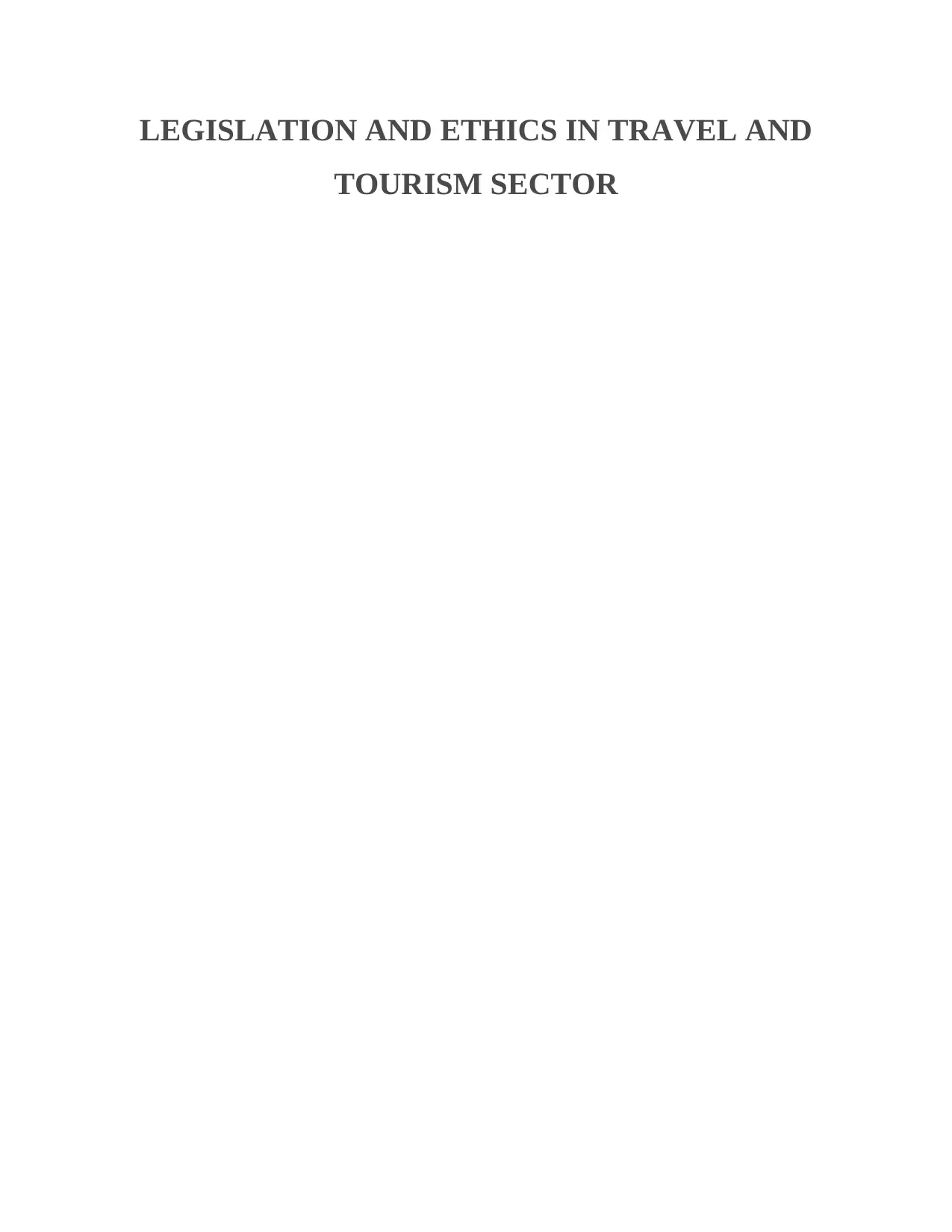
LEGISLATION AND ETHICS IN TRAVEL AND
TOURISM SECTOR
TOURISM SECTOR
Paraphrase This Document
Need a fresh take? Get an instant paraphrase of this document with our AI Paraphraser
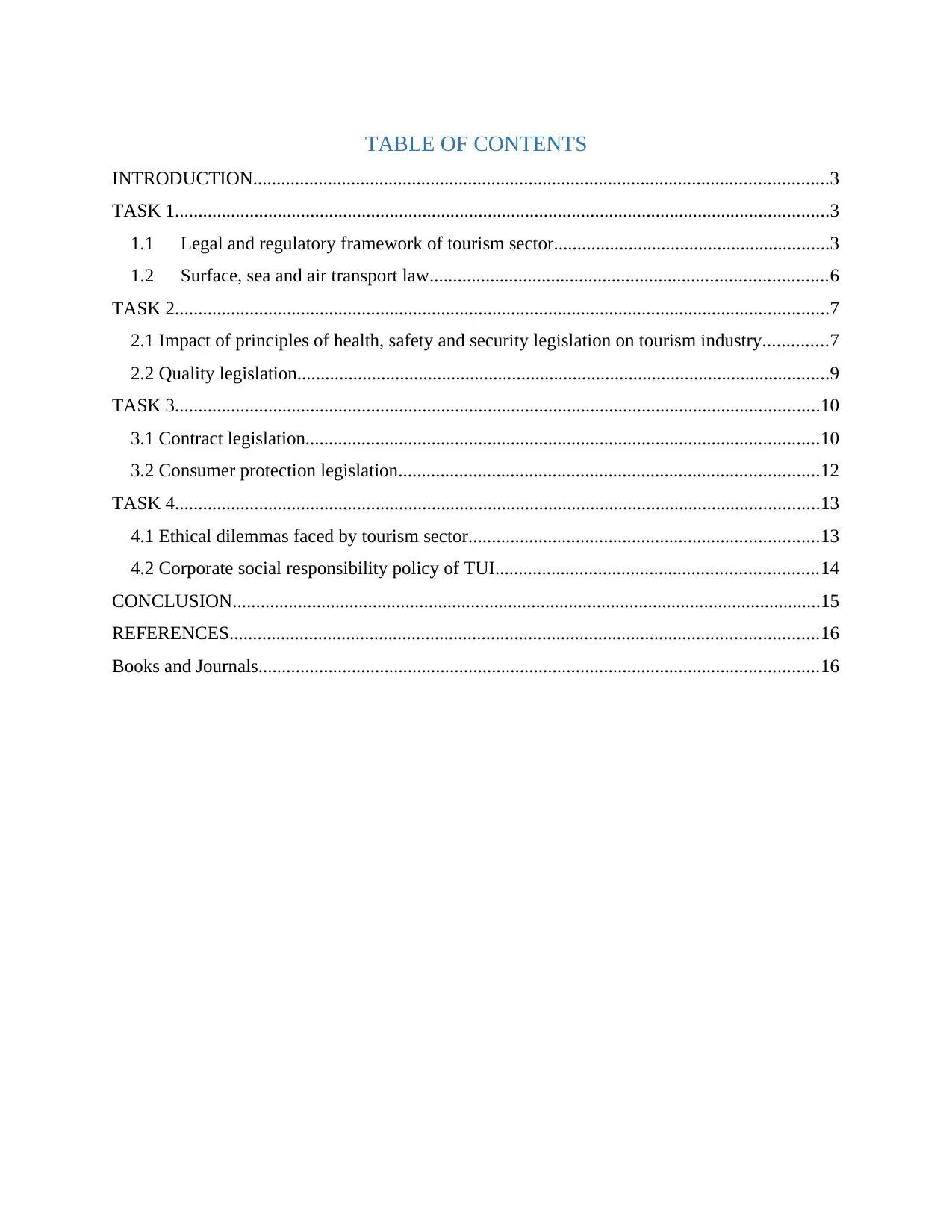
TABLE OF CONTENTS
INTRODUCTION...........................................................................................................................3
TASK 1............................................................................................................................................3
1.1 Legal and regulatory framework of tourism sector...........................................................3
1.2 Surface, sea and air transport law.....................................................................................6
TASK 2............................................................................................................................................7
2.1 Impact of principles of health, safety and security legislation on tourism industry..............7
2.2 Quality legislation..................................................................................................................9
TASK 3..........................................................................................................................................10
3.1 Contract legislation..............................................................................................................10
3.2 Consumer protection legislation..........................................................................................12
TASK 4..........................................................................................................................................13
4.1 Ethical dilemmas faced by tourism sector...........................................................................13
4.2 Corporate social responsibility policy of TUI.....................................................................14
CONCLUSION..............................................................................................................................15
REFERENCES..............................................................................................................................16
Books and Journals........................................................................................................................16
INTRODUCTION...........................................................................................................................3
TASK 1............................................................................................................................................3
1.1 Legal and regulatory framework of tourism sector...........................................................3
1.2 Surface, sea and air transport law.....................................................................................6
TASK 2............................................................................................................................................7
2.1 Impact of principles of health, safety and security legislation on tourism industry..............7
2.2 Quality legislation..................................................................................................................9
TASK 3..........................................................................................................................................10
3.1 Contract legislation..............................................................................................................10
3.2 Consumer protection legislation..........................................................................................12
TASK 4..........................................................................................................................................13
4.1 Ethical dilemmas faced by tourism sector...........................................................................13
4.2 Corporate social responsibility policy of TUI.....................................................................14
CONCLUSION..............................................................................................................................15
REFERENCES..............................................................................................................................16
Books and Journals........................................................................................................................16
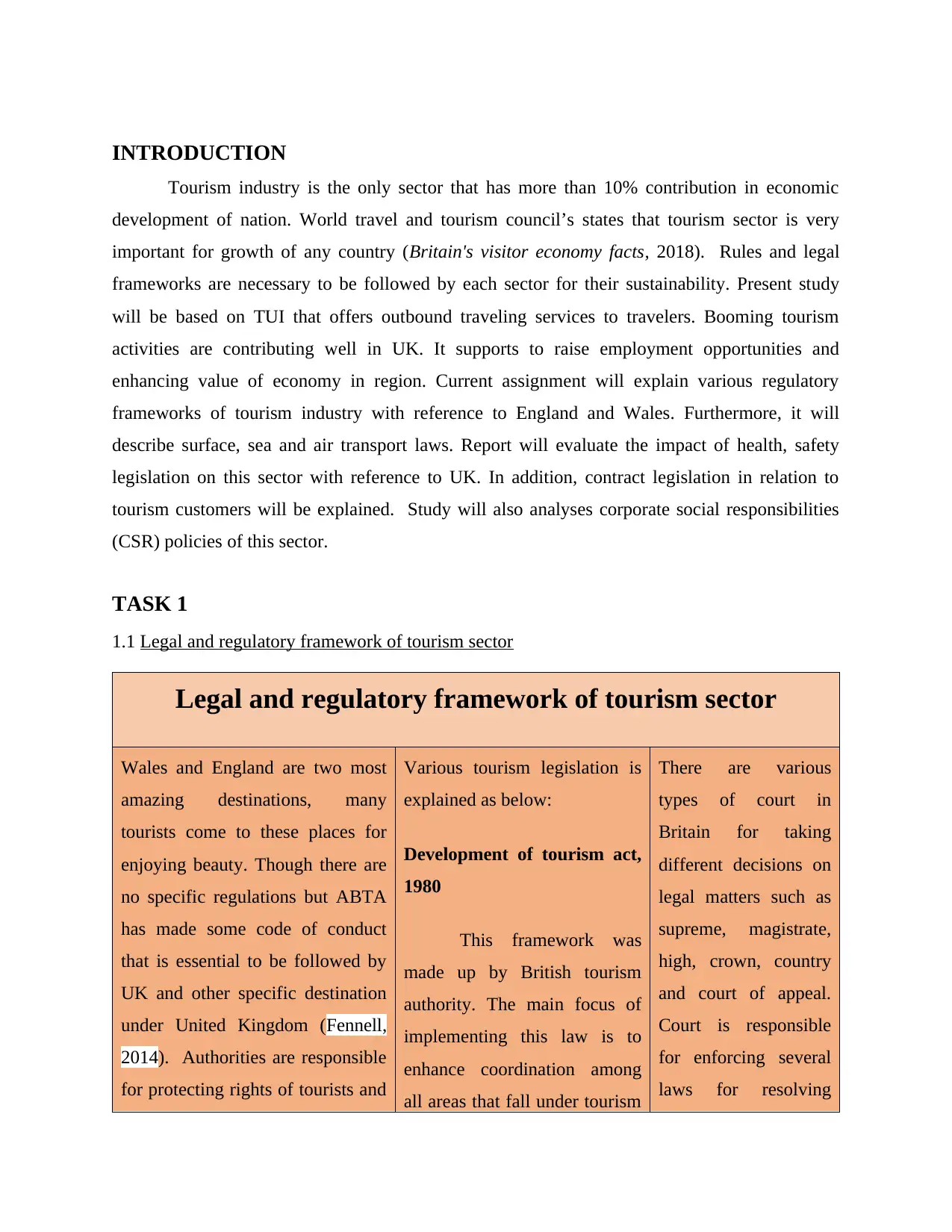
INTRODUCTION
Tourism industry is the only sector that has more than 10% contribution in economic
development of nation. World travel and tourism council’s states that tourism sector is very
important for growth of any country (Britain's visitor economy facts, 2018). Rules and legal
frameworks are necessary to be followed by each sector for their sustainability. Present study
will be based on TUI that offers outbound traveling services to travelers. Booming tourism
activities are contributing well in UK. It supports to raise employment opportunities and
enhancing value of economy in region. Current assignment will explain various regulatory
frameworks of tourism industry with reference to England and Wales. Furthermore, it will
describe surface, sea and air transport laws. Report will evaluate the impact of health, safety
legislation on this sector with reference to UK. In addition, contract legislation in relation to
tourism customers will be explained. Study will also analyses corporate social responsibilities
(CSR) policies of this sector.
TASK 1
1.1 Legal and regulatory framework of tourism sector
Legal and regulatory framework of tourism sector
Wales and England are two most
amazing destinations, many
tourists come to these places for
enjoying beauty. Though there are
no specific regulations but ABTA
has made some code of conduct
that is essential to be followed by
UK and other specific destination
under United Kingdom (Fennell,
2014). Authorities are responsible
for protecting rights of tourists and
Various tourism legislation is
explained as below:
Development of tourism act,
1980
This framework was
made up by British tourism
authority. The main focus of
implementing this law is to
enhance coordination among
all areas that fall under tourism
There are various
types of court in
Britain for taking
different decisions on
legal matters such as
supreme, magistrate,
high, crown, country
and court of appeal.
Court is responsible
for enforcing several
laws for resolving
Tourism industry is the only sector that has more than 10% contribution in economic
development of nation. World travel and tourism council’s states that tourism sector is very
important for growth of any country (Britain's visitor economy facts, 2018). Rules and legal
frameworks are necessary to be followed by each sector for their sustainability. Present study
will be based on TUI that offers outbound traveling services to travelers. Booming tourism
activities are contributing well in UK. It supports to raise employment opportunities and
enhancing value of economy in region. Current assignment will explain various regulatory
frameworks of tourism industry with reference to England and Wales. Furthermore, it will
describe surface, sea and air transport laws. Report will evaluate the impact of health, safety
legislation on this sector with reference to UK. In addition, contract legislation in relation to
tourism customers will be explained. Study will also analyses corporate social responsibilities
(CSR) policies of this sector.
TASK 1
1.1 Legal and regulatory framework of tourism sector
Legal and regulatory framework of tourism sector
Wales and England are two most
amazing destinations, many
tourists come to these places for
enjoying beauty. Though there are
no specific regulations but ABTA
has made some code of conduct
that is essential to be followed by
UK and other specific destination
under United Kingdom (Fennell,
2014). Authorities are responsible
for protecting rights of tourists and
Various tourism legislation is
explained as below:
Development of tourism act,
1980
This framework was
made up by British tourism
authority. The main focus of
implementing this law is to
enhance coordination among
all areas that fall under tourism
There are various
types of court in
Britain for taking
different decisions on
legal matters such as
supreme, magistrate,
high, crown, country
and court of appeal.
Court is responsible
for enforcing several
laws for resolving
⊘ This is a preview!⊘
Do you want full access?
Subscribe today to unlock all pages.

Trusted by 1+ million students worldwide
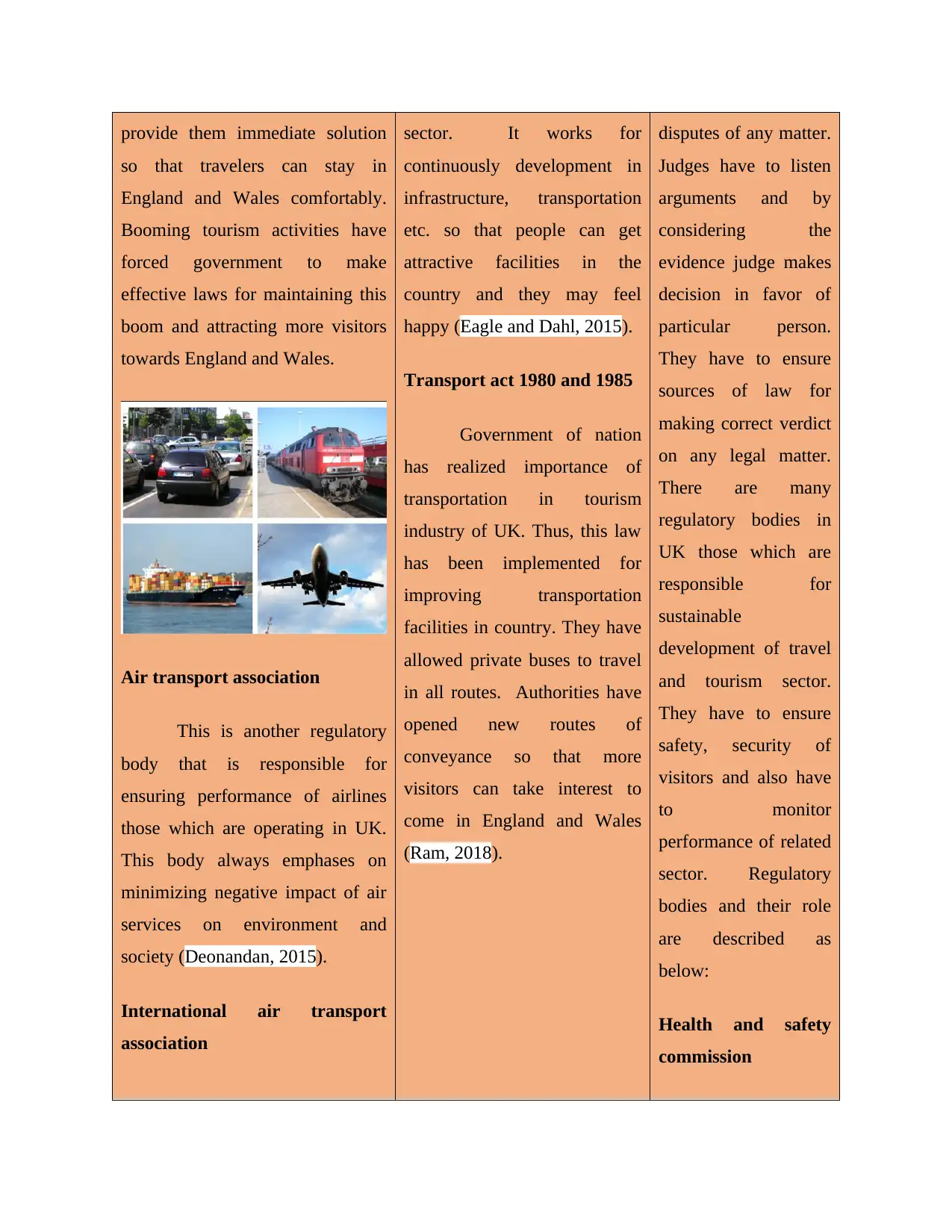
provide them immediate solution
so that travelers can stay in
England and Wales comfortably.
Booming tourism activities have
forced government to make
effective laws for maintaining this
boom and attracting more visitors
towards England and Wales.
Air transport association
This is another regulatory
body that is responsible for
ensuring performance of airlines
those which are operating in UK.
This body always emphases on
minimizing negative impact of air
services on environment and
society (Deonandan, 2015).
International air transport
association
sector. It works for
continuously development in
infrastructure, transportation
etc. so that people can get
attractive facilities in the
country and they may feel
happy (Eagle and Dahl, 2015).
Transport act 1980 and 1985
Government of nation
has realized importance of
transportation in tourism
industry of UK. Thus, this law
has been implemented for
improving transportation
facilities in country. They have
allowed private buses to travel
in all routes. Authorities have
opened new routes of
conveyance so that more
visitors can take interest to
come in England and Wales
(Ram, 2018).
disputes of any matter.
Judges have to listen
arguments and by
considering the
evidence judge makes
decision in favor of
particular person.
They have to ensure
sources of law for
making correct verdict
on any legal matter.
There are many
regulatory bodies in
UK those which are
responsible for
sustainable
development of travel
and tourism sector.
They have to ensure
safety, security of
visitors and also have
to monitor
performance of related
sector. Regulatory
bodies and their role
are described as
below:
Health and safety
commission
so that travelers can stay in
England and Wales comfortably.
Booming tourism activities have
forced government to make
effective laws for maintaining this
boom and attracting more visitors
towards England and Wales.
Air transport association
This is another regulatory
body that is responsible for
ensuring performance of airlines
those which are operating in UK.
This body always emphases on
minimizing negative impact of air
services on environment and
society (Deonandan, 2015).
International air transport
association
sector. It works for
continuously development in
infrastructure, transportation
etc. so that people can get
attractive facilities in the
country and they may feel
happy (Eagle and Dahl, 2015).
Transport act 1980 and 1985
Government of nation
has realized importance of
transportation in tourism
industry of UK. Thus, this law
has been implemented for
improving transportation
facilities in country. They have
allowed private buses to travel
in all routes. Authorities have
opened new routes of
conveyance so that more
visitors can take interest to
come in England and Wales
(Ram, 2018).
disputes of any matter.
Judges have to listen
arguments and by
considering the
evidence judge makes
decision in favor of
particular person.
They have to ensure
sources of law for
making correct verdict
on any legal matter.
There are many
regulatory bodies in
UK those which are
responsible for
sustainable
development of travel
and tourism sector.
They have to ensure
safety, security of
visitors and also have
to monitor
performance of related
sector. Regulatory
bodies and their role
are described as
below:
Health and safety
commission
Paraphrase This Document
Need a fresh take? Get an instant paraphrase of this document with our AI Paraphraser
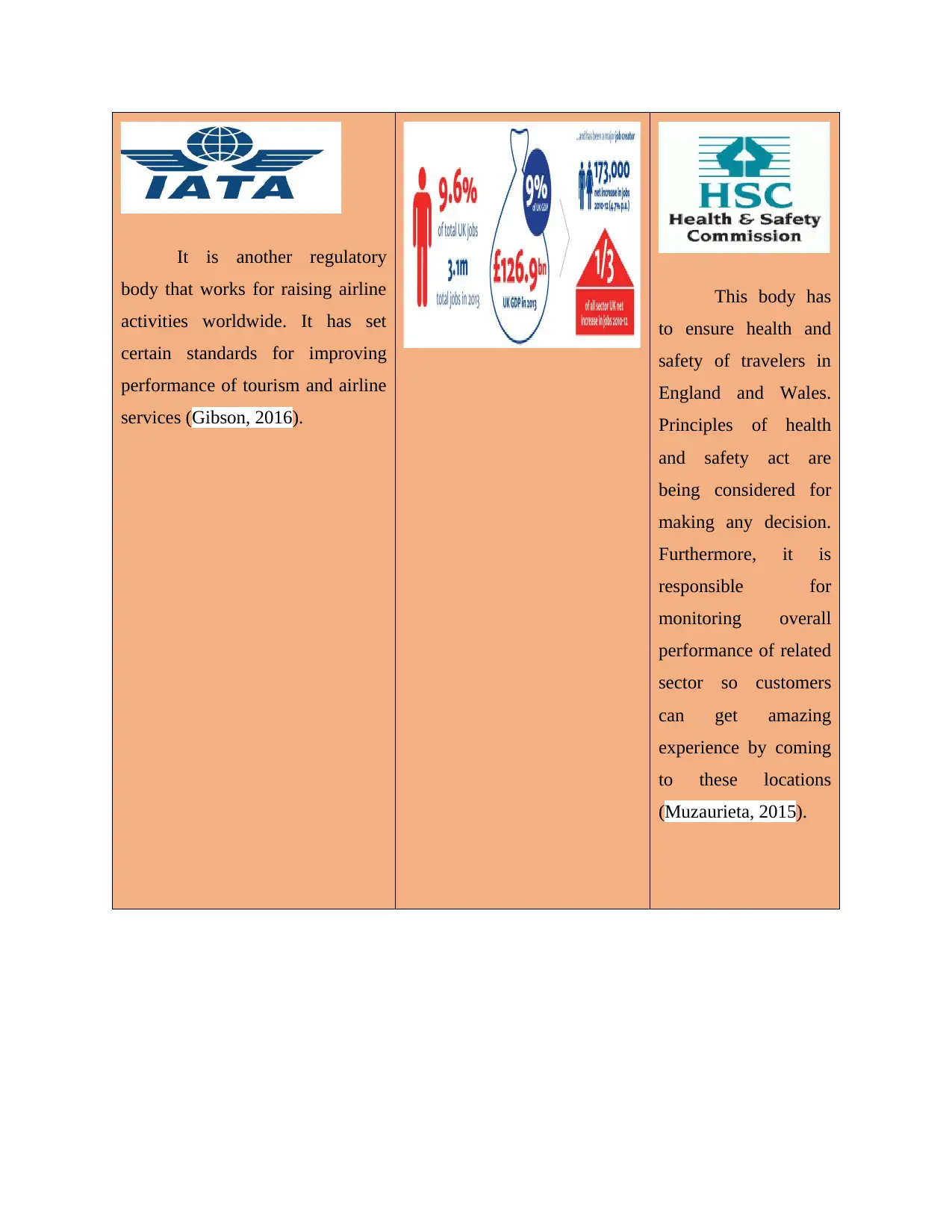
It is another regulatory
body that works for raising airline
activities worldwide. It has set
certain standards for improving
performance of tourism and airline
services (Gibson, 2016).
This body has
to ensure health and
safety of travelers in
England and Wales.
Principles of health
and safety act are
being considered for
making any decision.
Furthermore, it is
responsible for
monitoring overall
performance of related
sector so customers
can get amazing
experience by coming
to these locations
(Muzaurieta, 2015).
body that works for raising airline
activities worldwide. It has set
certain standards for improving
performance of tourism and airline
services (Gibson, 2016).
This body has
to ensure health and
safety of travelers in
England and Wales.
Principles of health
and safety act are
being considered for
making any decision.
Furthermore, it is
responsible for
monitoring overall
performance of related
sector so customers
can get amazing
experience by coming
to these locations
(Muzaurieta, 2015).
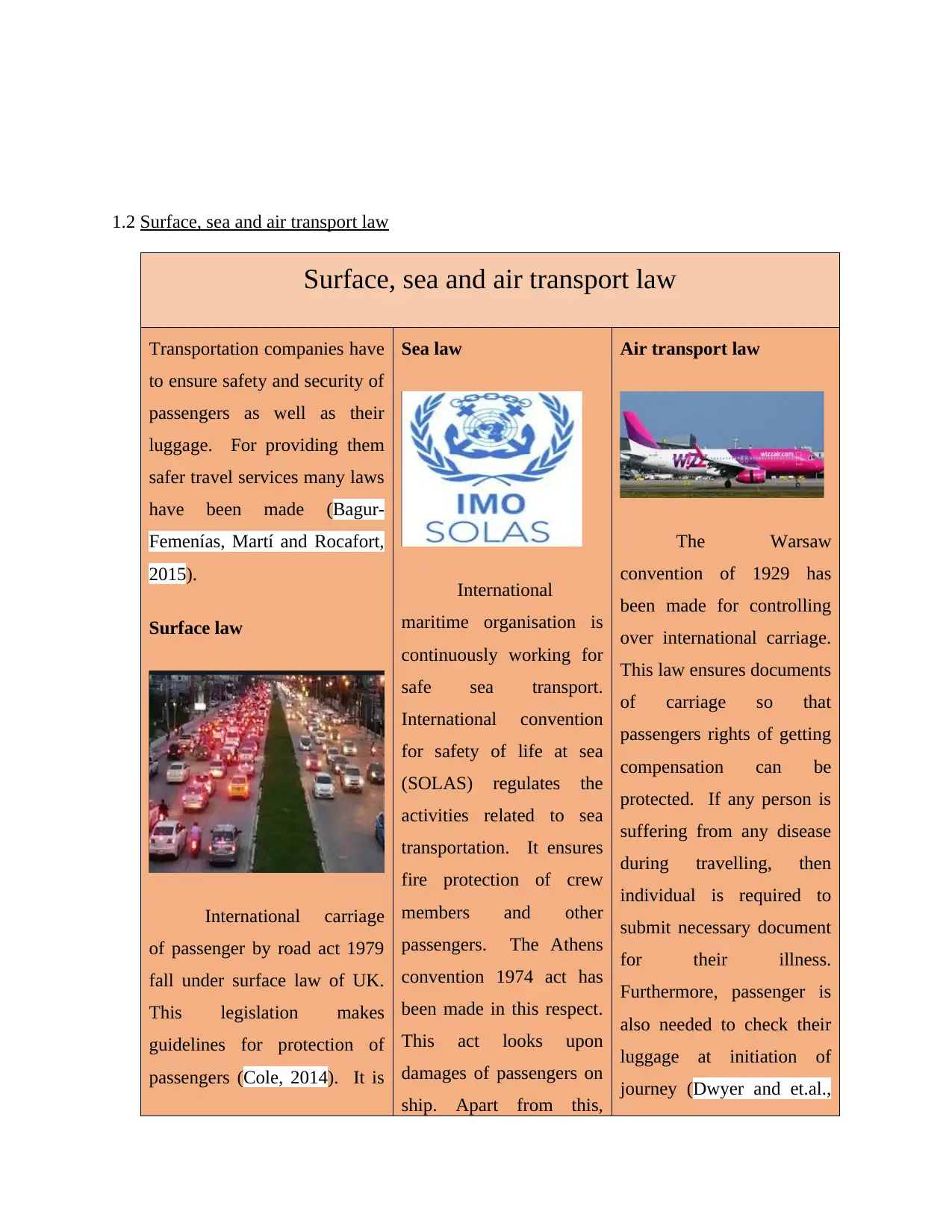
1.2 Surface, sea and air transport law
Surface, sea and air transport law
Transportation companies have
to ensure safety and security of
passengers as well as their
luggage. For providing them
safer travel services many laws
have been made (Bagur-
Femenías, Martí and Rocafort,
2015).
Surface law
International carriage
of passenger by road act 1979
fall under surface law of UK.
This legislation makes
guidelines for protection of
passengers (Cole, 2014). It is
Sea law
International
maritime organisation is
continuously working for
safe sea transport.
International convention
for safety of life at sea
(SOLAS) regulates the
activities related to sea
transportation. It ensures
fire protection of crew
members and other
passengers. The Athens
convention 1974 act has
been made in this respect.
This act looks upon
damages of passengers on
ship. Apart from this,
Air transport law
The Warsaw
convention of 1929 has
been made for controlling
over international carriage.
This law ensures documents
of carriage so that
passengers rights of getting
compensation can be
protected. If any person is
suffering from any disease
during travelling, then
individual is required to
submit necessary document
for their illness.
Furthermore, passenger is
also needed to check their
luggage at initiation of
journey (Dwyer and et.al.,
Surface, sea and air transport law
Transportation companies have
to ensure safety and security of
passengers as well as their
luggage. For providing them
safer travel services many laws
have been made (Bagur-
Femenías, Martí and Rocafort,
2015).
Surface law
International carriage
of passenger by road act 1979
fall under surface law of UK.
This legislation makes
guidelines for protection of
passengers (Cole, 2014). It is
Sea law
International
maritime organisation is
continuously working for
safe sea transport.
International convention
for safety of life at sea
(SOLAS) regulates the
activities related to sea
transportation. It ensures
fire protection of crew
members and other
passengers. The Athens
convention 1974 act has
been made in this respect.
This act looks upon
damages of passengers on
ship. Apart from this,
Air transport law
The Warsaw
convention of 1929 has
been made for controlling
over international carriage.
This law ensures documents
of carriage so that
passengers rights of getting
compensation can be
protected. If any person is
suffering from any disease
during travelling, then
individual is required to
submit necessary document
for their illness.
Furthermore, passenger is
also needed to check their
luggage at initiation of
journey (Dwyer and et.al.,
⊘ This is a preview!⊘
Do you want full access?
Subscribe today to unlock all pages.

Trusted by 1+ million students worldwide
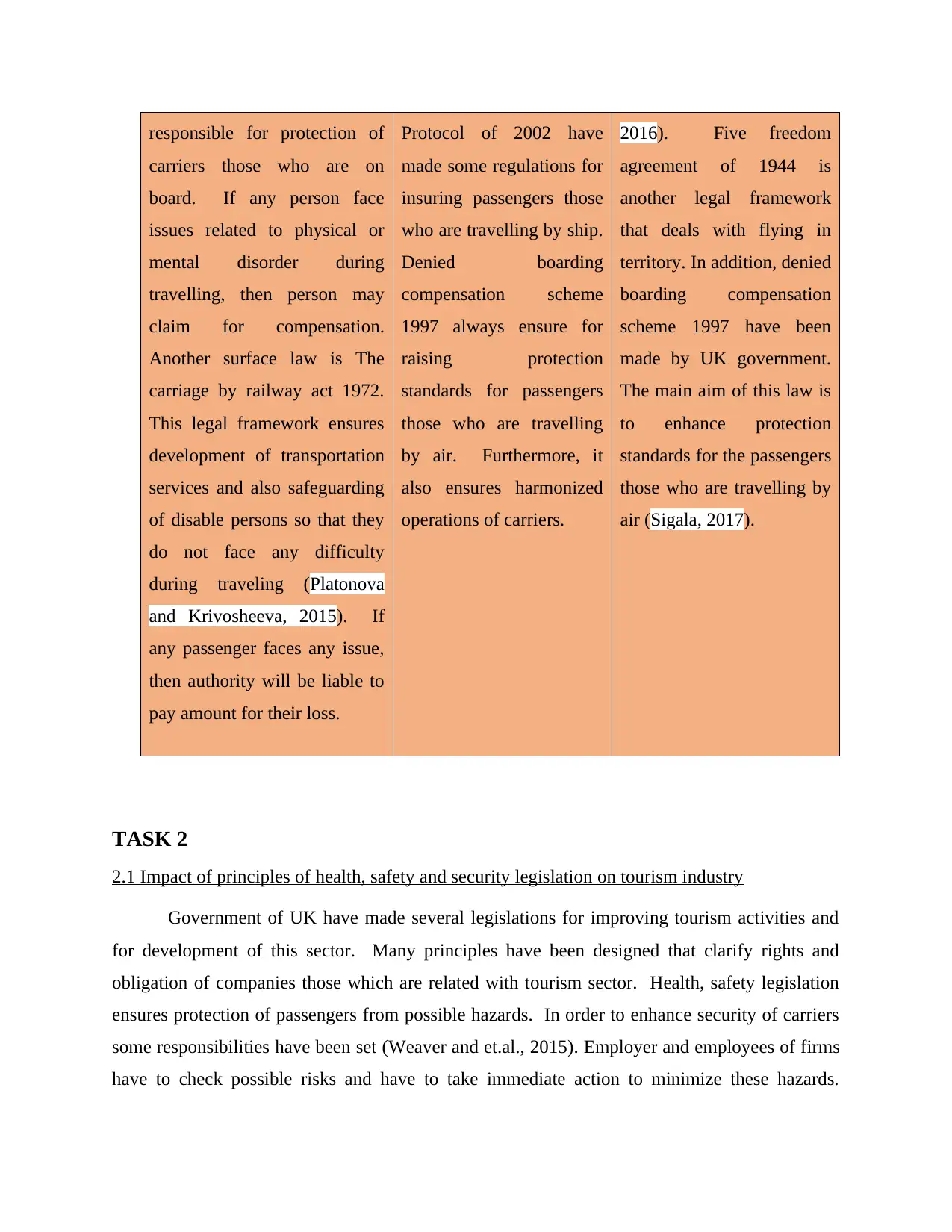
responsible for protection of
carriers those who are on
board. If any person face
issues related to physical or
mental disorder during
travelling, then person may
claim for compensation.
Another surface law is The
carriage by railway act 1972.
This legal framework ensures
development of transportation
services and also safeguarding
of disable persons so that they
do not face any difficulty
during traveling (Platonova
and Krivosheeva, 2015). If
any passenger faces any issue,
then authority will be liable to
pay amount for their loss.
Protocol of 2002 have
made some regulations for
insuring passengers those
who are travelling by ship.
Denied boarding
compensation scheme
1997 always ensure for
raising protection
standards for passengers
those who are travelling
by air. Furthermore, it
also ensures harmonized
operations of carriers.
2016). Five freedom
agreement of 1944 is
another legal framework
that deals with flying in
territory. In addition, denied
boarding compensation
scheme 1997 have been
made by UK government.
The main aim of this law is
to enhance protection
standards for the passengers
those who are travelling by
air (Sigala, 2017).
TASK 2
2.1 Impact of principles of health, safety and security legislation on tourism industry
Government of UK have made several legislations for improving tourism activities and
for development of this sector. Many principles have been designed that clarify rights and
obligation of companies those which are related with tourism sector. Health, safety legislation
ensures protection of passengers from possible hazards. In order to enhance security of carriers
some responsibilities have been set (Weaver and et.al., 2015). Employer and employees of firms
have to check possible risks and have to take immediate action to minimize these hazards.
carriers those who are on
board. If any person face
issues related to physical or
mental disorder during
travelling, then person may
claim for compensation.
Another surface law is The
carriage by railway act 1972.
This legal framework ensures
development of transportation
services and also safeguarding
of disable persons so that they
do not face any difficulty
during traveling (Platonova
and Krivosheeva, 2015). If
any passenger faces any issue,
then authority will be liable to
pay amount for their loss.
Protocol of 2002 have
made some regulations for
insuring passengers those
who are travelling by ship.
Denied boarding
compensation scheme
1997 always ensure for
raising protection
standards for passengers
those who are travelling
by air. Furthermore, it
also ensures harmonized
operations of carriers.
2016). Five freedom
agreement of 1944 is
another legal framework
that deals with flying in
territory. In addition, denied
boarding compensation
scheme 1997 have been
made by UK government.
The main aim of this law is
to enhance protection
standards for the passengers
those who are travelling by
air (Sigala, 2017).
TASK 2
2.1 Impact of principles of health, safety and security legislation on tourism industry
Government of UK have made several legislations for improving tourism activities and
for development of this sector. Many principles have been designed that clarify rights and
obligation of companies those which are related with tourism sector. Health, safety legislation
ensures protection of passengers from possible hazards. In order to enhance security of carriers
some responsibilities have been set (Weaver and et.al., 2015). Employer and employees of firms
have to check possible risks and have to take immediate action to minimize these hazards.
Paraphrase This Document
Need a fresh take? Get an instant paraphrase of this document with our AI Paraphraser
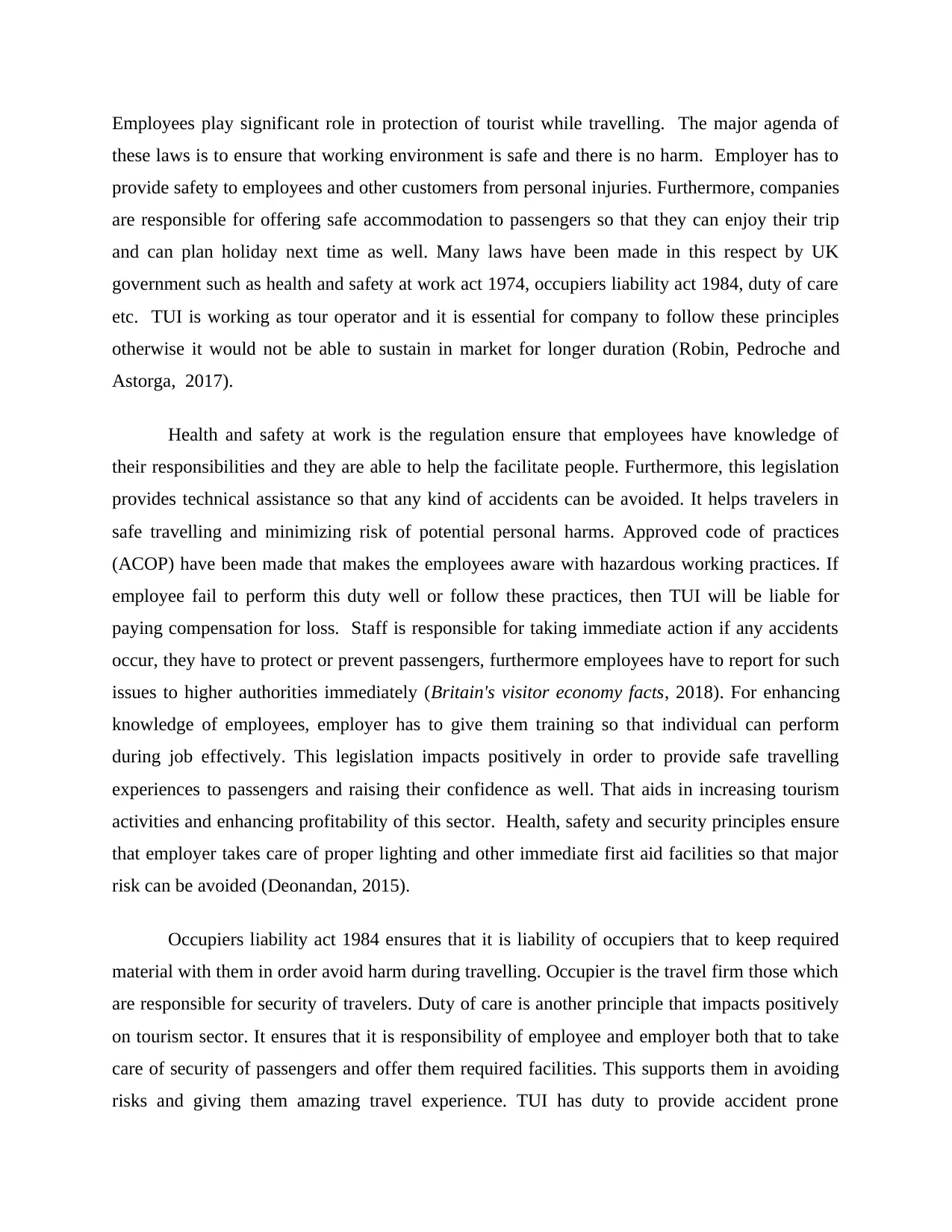
Employees play significant role in protection of tourist while travelling. The major agenda of
these laws is to ensure that working environment is safe and there is no harm. Employer has to
provide safety to employees and other customers from personal injuries. Furthermore, companies
are responsible for offering safe accommodation to passengers so that they can enjoy their trip
and can plan holiday next time as well. Many laws have been made in this respect by UK
government such as health and safety at work act 1974, occupiers liability act 1984, duty of care
etc. TUI is working as tour operator and it is essential for company to follow these principles
otherwise it would not be able to sustain in market for longer duration (Robin, Pedroche and
Astorga, 2017).
Health and safety at work is the regulation ensure that employees have knowledge of
their responsibilities and they are able to help the facilitate people. Furthermore, this legislation
provides technical assistance so that any kind of accidents can be avoided. It helps travelers in
safe travelling and minimizing risk of potential personal harms. Approved code of practices
(ACOP) have been made that makes the employees aware with hazardous working practices. If
employee fail to perform this duty well or follow these practices, then TUI will be liable for
paying compensation for loss. Staff is responsible for taking immediate action if any accidents
occur, they have to protect or prevent passengers, furthermore employees have to report for such
issues to higher authorities immediately (Britain's visitor economy facts, 2018). For enhancing
knowledge of employees, employer has to give them training so that individual can perform
during job effectively. This legislation impacts positively in order to provide safe travelling
experiences to passengers and raising their confidence as well. That aids in increasing tourism
activities and enhancing profitability of this sector. Health, safety and security principles ensure
that employer takes care of proper lighting and other immediate first aid facilities so that major
risk can be avoided (Deonandan, 2015).
Occupiers liability act 1984 ensures that it is liability of occupiers that to keep required
material with them in order avoid harm during travelling. Occupier is the travel firm those which
are responsible for security of travelers. Duty of care is another principle that impacts positively
on tourism sector. It ensures that it is responsibility of employee and employer both that to take
care of security of passengers and offer them required facilities. This supports them in avoiding
risks and giving them amazing travel experience. TUI has duty to provide accident prone
these laws is to ensure that working environment is safe and there is no harm. Employer has to
provide safety to employees and other customers from personal injuries. Furthermore, companies
are responsible for offering safe accommodation to passengers so that they can enjoy their trip
and can plan holiday next time as well. Many laws have been made in this respect by UK
government such as health and safety at work act 1974, occupiers liability act 1984, duty of care
etc. TUI is working as tour operator and it is essential for company to follow these principles
otherwise it would not be able to sustain in market for longer duration (Robin, Pedroche and
Astorga, 2017).
Health and safety at work is the regulation ensure that employees have knowledge of
their responsibilities and they are able to help the facilitate people. Furthermore, this legislation
provides technical assistance so that any kind of accidents can be avoided. It helps travelers in
safe travelling and minimizing risk of potential personal harms. Approved code of practices
(ACOP) have been made that makes the employees aware with hazardous working practices. If
employee fail to perform this duty well or follow these practices, then TUI will be liable for
paying compensation for loss. Staff is responsible for taking immediate action if any accidents
occur, they have to protect or prevent passengers, furthermore employees have to report for such
issues to higher authorities immediately (Britain's visitor economy facts, 2018). For enhancing
knowledge of employees, employer has to give them training so that individual can perform
during job effectively. This legislation impacts positively in order to provide safe travelling
experiences to passengers and raising their confidence as well. That aids in increasing tourism
activities and enhancing profitability of this sector. Health, safety and security principles ensure
that employer takes care of proper lighting and other immediate first aid facilities so that major
risk can be avoided (Deonandan, 2015).
Occupiers liability act 1984 ensures that it is liability of occupiers that to keep required
material with them in order avoid harm during travelling. Occupier is the travel firm those which
are responsible for security of travelers. Duty of care is another principle that impacts positively
on tourism sector. It ensures that it is responsibility of employee and employer both that to take
care of security of passengers and offer them required facilities. This supports them in avoiding
risks and giving them amazing travel experience. TUI has duty to provide accident prone
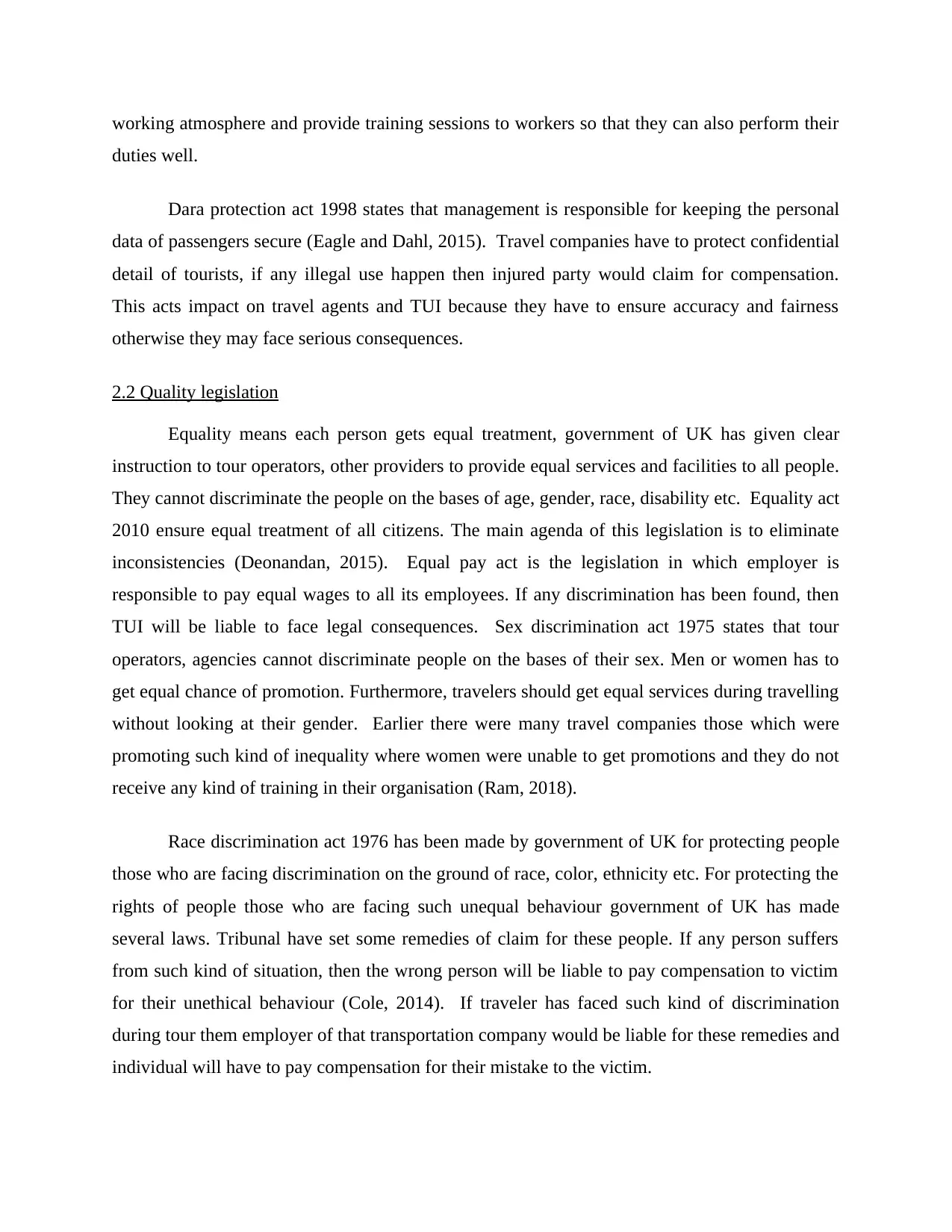
working atmosphere and provide training sessions to workers so that they can also perform their
duties well.
Dara protection act 1998 states that management is responsible for keeping the personal
data of passengers secure (Eagle and Dahl, 2015). Travel companies have to protect confidential
detail of tourists, if any illegal use happen then injured party would claim for compensation.
This acts impact on travel agents and TUI because they have to ensure accuracy and fairness
otherwise they may face serious consequences.
2.2 Quality legislation
Equality means each person gets equal treatment, government of UK has given clear
instruction to tour operators, other providers to provide equal services and facilities to all people.
They cannot discriminate the people on the bases of age, gender, race, disability etc. Equality act
2010 ensure equal treatment of all citizens. The main agenda of this legislation is to eliminate
inconsistencies (Deonandan, 2015). Equal pay act is the legislation in which employer is
responsible to pay equal wages to all its employees. If any discrimination has been found, then
TUI will be liable to face legal consequences. Sex discrimination act 1975 states that tour
operators, agencies cannot discriminate people on the bases of their sex. Men or women has to
get equal chance of promotion. Furthermore, travelers should get equal services during travelling
without looking at their gender. Earlier there were many travel companies those which were
promoting such kind of inequality where women were unable to get promotions and they do not
receive any kind of training in their organisation (Ram, 2018).
Race discrimination act 1976 has been made by government of UK for protecting people
those who are facing discrimination on the ground of race, color, ethnicity etc. For protecting the
rights of people those who are facing such unequal behaviour government of UK has made
several laws. Tribunal have set some remedies of claim for these people. If any person suffers
from such kind of situation, then the wrong person will be liable to pay compensation to victim
for their unethical behaviour (Cole, 2014). If traveler has faced such kind of discrimination
during tour them employer of that transportation company would be liable for these remedies and
individual will have to pay compensation for their mistake to the victim.
duties well.
Dara protection act 1998 states that management is responsible for keeping the personal
data of passengers secure (Eagle and Dahl, 2015). Travel companies have to protect confidential
detail of tourists, if any illegal use happen then injured party would claim for compensation.
This acts impact on travel agents and TUI because they have to ensure accuracy and fairness
otherwise they may face serious consequences.
2.2 Quality legislation
Equality means each person gets equal treatment, government of UK has given clear
instruction to tour operators, other providers to provide equal services and facilities to all people.
They cannot discriminate the people on the bases of age, gender, race, disability etc. Equality act
2010 ensure equal treatment of all citizens. The main agenda of this legislation is to eliminate
inconsistencies (Deonandan, 2015). Equal pay act is the legislation in which employer is
responsible to pay equal wages to all its employees. If any discrimination has been found, then
TUI will be liable to face legal consequences. Sex discrimination act 1975 states that tour
operators, agencies cannot discriminate people on the bases of their sex. Men or women has to
get equal chance of promotion. Furthermore, travelers should get equal services during travelling
without looking at their gender. Earlier there were many travel companies those which were
promoting such kind of inequality where women were unable to get promotions and they do not
receive any kind of training in their organisation (Ram, 2018).
Race discrimination act 1976 has been made by government of UK for protecting people
those who are facing discrimination on the ground of race, color, ethnicity etc. For protecting the
rights of people those who are facing such unequal behaviour government of UK has made
several laws. Tribunal have set some remedies of claim for these people. If any person suffers
from such kind of situation, then the wrong person will be liable to pay compensation to victim
for their unethical behaviour (Cole, 2014). If traveler has faced such kind of discrimination
during tour them employer of that transportation company would be liable for these remedies and
individual will have to pay compensation for their mistake to the victim.
⊘ This is a preview!⊘
Do you want full access?
Subscribe today to unlock all pages.

Trusted by 1+ million students worldwide
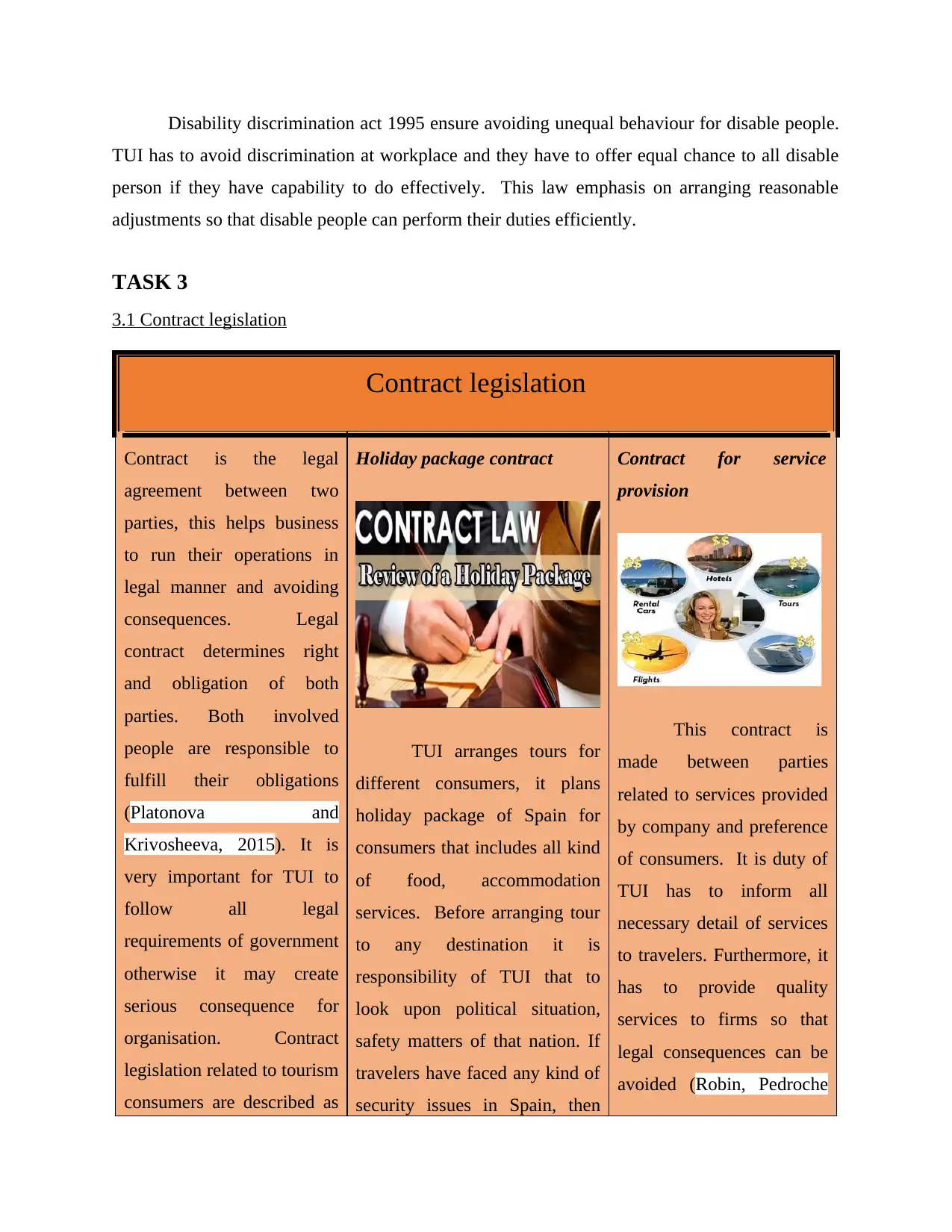
Disability discrimination act 1995 ensure avoiding unequal behaviour for disable people.
TUI has to avoid discrimination at workplace and they have to offer equal chance to all disable
person if they have capability to do effectively. This law emphasis on arranging reasonable
adjustments so that disable people can perform their duties efficiently.
TASK 3
3.1 Contract legislation
Contract legislation
Contract is the legal
agreement between two
parties, this helps business
to run their operations in
legal manner and avoiding
consequences. Legal
contract determines right
and obligation of both
parties. Both involved
people are responsible to
fulfill their obligations
(Platonova and
Krivosheeva, 2015). It is
very important for TUI to
follow all legal
requirements of government
otherwise it may create
serious consequence for
organisation. Contract
legislation related to tourism
consumers are described as
Holiday package contract
TUI arranges tours for
different consumers, it plans
holiday package of Spain for
consumers that includes all kind
of food, accommodation
services. Before arranging tour
to any destination it is
responsibility of TUI that to
look upon political situation,
safety matters of that nation. If
travelers have faced any kind of
security issues in Spain, then
Contract for service
provision
This contract is
made between parties
related to services provided
by company and preference
of consumers. It is duty of
TUI has to inform all
necessary detail of services
to travelers. Furthermore, it
has to provide quality
services to firms so that
legal consequences can be
avoided (Robin, Pedroche
TUI has to avoid discrimination at workplace and they have to offer equal chance to all disable
person if they have capability to do effectively. This law emphasis on arranging reasonable
adjustments so that disable people can perform their duties efficiently.
TASK 3
3.1 Contract legislation
Contract legislation
Contract is the legal
agreement between two
parties, this helps business
to run their operations in
legal manner and avoiding
consequences. Legal
contract determines right
and obligation of both
parties. Both involved
people are responsible to
fulfill their obligations
(Platonova and
Krivosheeva, 2015). It is
very important for TUI to
follow all legal
requirements of government
otherwise it may create
serious consequence for
organisation. Contract
legislation related to tourism
consumers are described as
Holiday package contract
TUI arranges tours for
different consumers, it plans
holiday package of Spain for
consumers that includes all kind
of food, accommodation
services. Before arranging tour
to any destination it is
responsibility of TUI that to
look upon political situation,
safety matters of that nation. If
travelers have faced any kind of
security issues in Spain, then
Contract for service
provision
This contract is
made between parties
related to services provided
by company and preference
of consumers. It is duty of
TUI has to inform all
necessary detail of services
to travelers. Furthermore, it
has to provide quality
services to firms so that
legal consequences can be
avoided (Robin, Pedroche
Paraphrase This Document
Need a fresh take? Get an instant paraphrase of this document with our AI Paraphraser
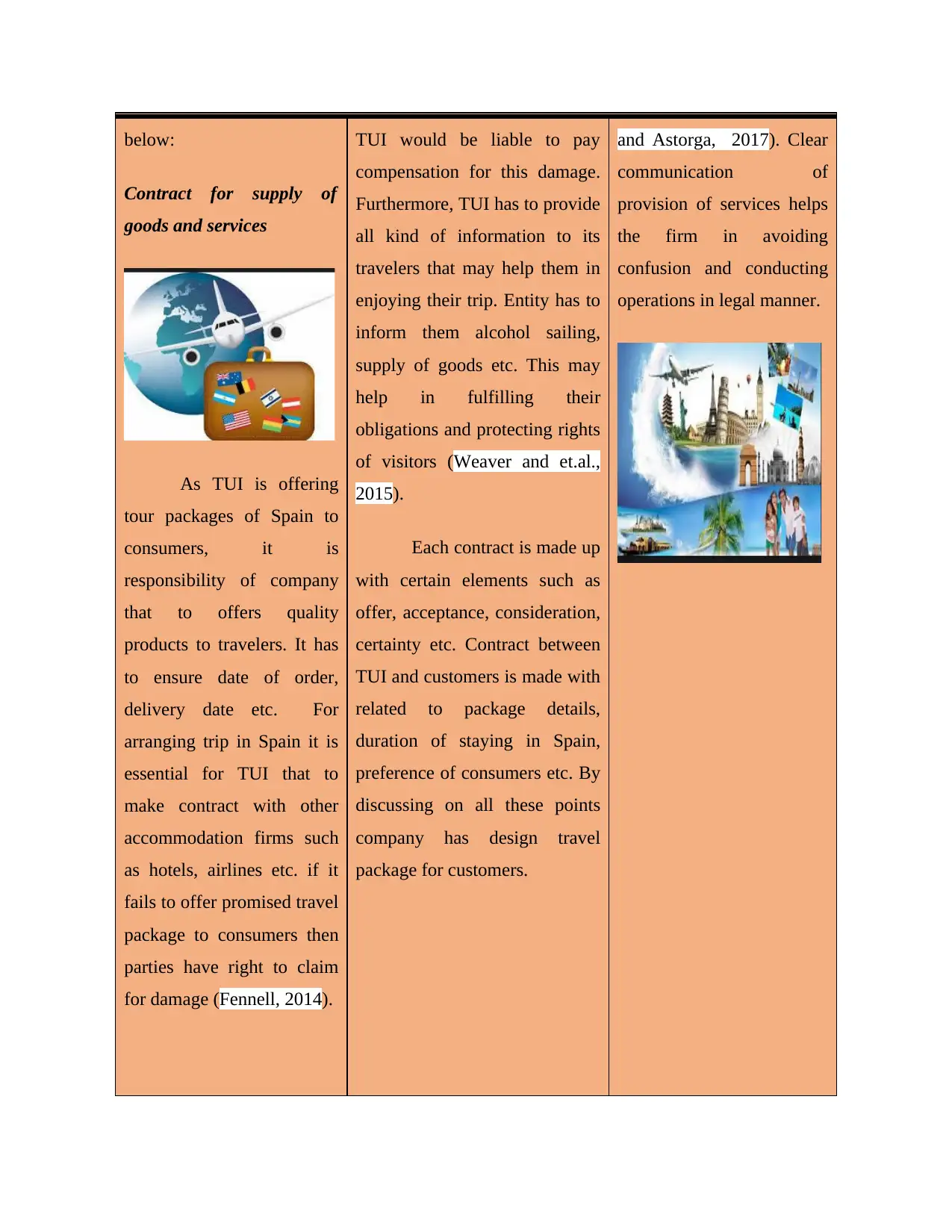
below:
Contract for supply of
goods and services
As TUI is offering
tour packages of Spain to
consumers, it is
responsibility of company
that to offers quality
products to travelers. It has
to ensure date of order,
delivery date etc. For
arranging trip in Spain it is
essential for TUI that to
make contract with other
accommodation firms such
as hotels, airlines etc. if it
fails to offer promised travel
package to consumers then
parties have right to claim
for damage (Fennell, 2014).
TUI would be liable to pay
compensation for this damage.
Furthermore, TUI has to provide
all kind of information to its
travelers that may help them in
enjoying their trip. Entity has to
inform them alcohol sailing,
supply of goods etc. This may
help in fulfilling their
obligations and protecting rights
of visitors (Weaver and et.al.,
2015).
Each contract is made up
with certain elements such as
offer, acceptance, consideration,
certainty etc. Contract between
TUI and customers is made with
related to package details,
duration of staying in Spain,
preference of consumers etc. By
discussing on all these points
company has design travel
package for customers.
and Astorga, 2017). Clear
communication of
provision of services helps
the firm in avoiding
confusion and conducting
operations in legal manner.
Contract for supply of
goods and services
As TUI is offering
tour packages of Spain to
consumers, it is
responsibility of company
that to offers quality
products to travelers. It has
to ensure date of order,
delivery date etc. For
arranging trip in Spain it is
essential for TUI that to
make contract with other
accommodation firms such
as hotels, airlines etc. if it
fails to offer promised travel
package to consumers then
parties have right to claim
for damage (Fennell, 2014).
TUI would be liable to pay
compensation for this damage.
Furthermore, TUI has to provide
all kind of information to its
travelers that may help them in
enjoying their trip. Entity has to
inform them alcohol sailing,
supply of goods etc. This may
help in fulfilling their
obligations and protecting rights
of visitors (Weaver and et.al.,
2015).
Each contract is made up
with certain elements such as
offer, acceptance, consideration,
certainty etc. Contract between
TUI and customers is made with
related to package details,
duration of staying in Spain,
preference of consumers etc. By
discussing on all these points
company has design travel
package for customers.
and Astorga, 2017). Clear
communication of
provision of services helps
the firm in avoiding
confusion and conducting
operations in legal manner.
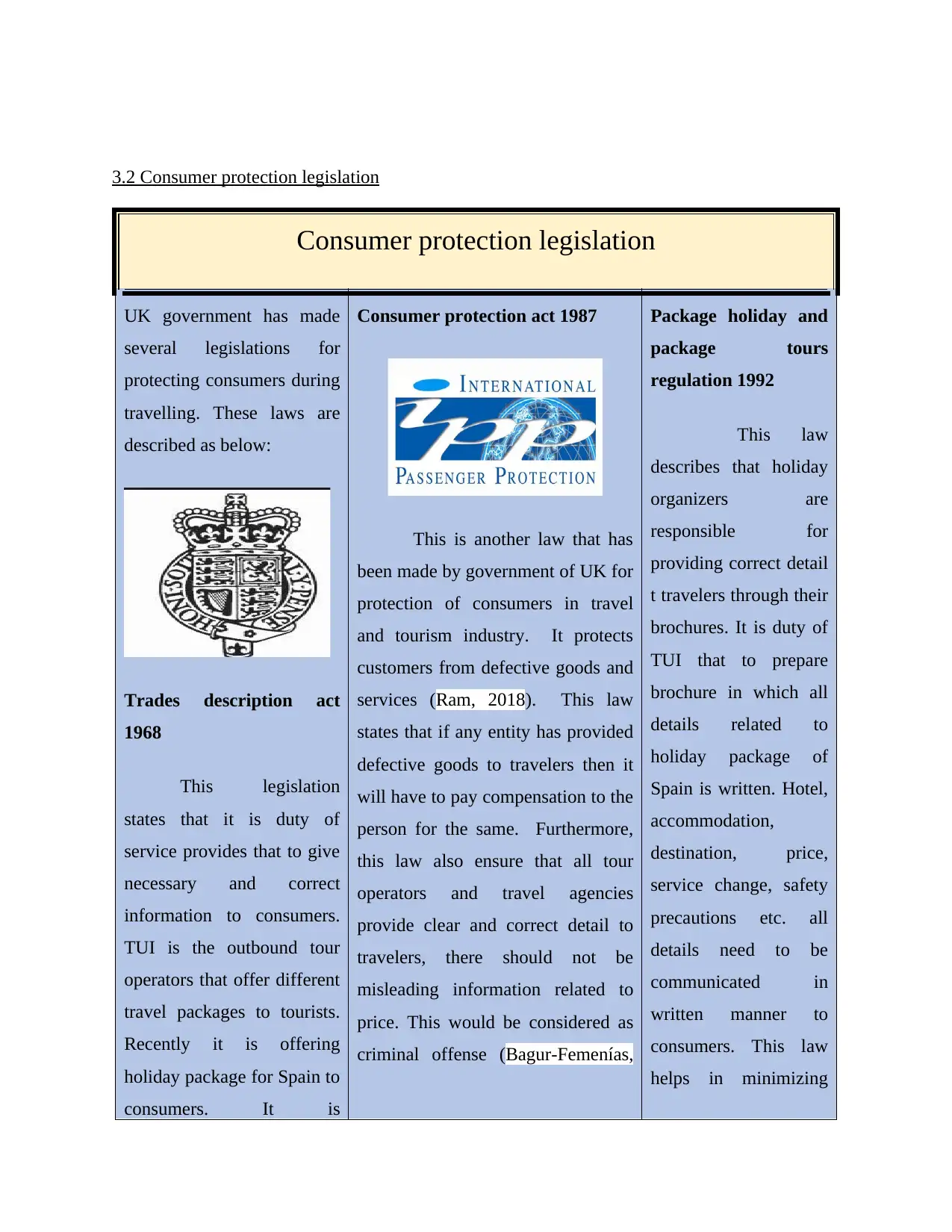
3.2 Consumer protection legislation
Consumer protection legislation
UK government has made
several legislations for
protecting consumers during
travelling. These laws are
described as below:
Trades description act
1968
This legislation
states that it is duty of
service provides that to give
necessary and correct
information to consumers.
TUI is the outbound tour
operators that offer different
travel packages to tourists.
Recently it is offering
holiday package for Spain to
consumers. It is
Consumer protection act 1987
This is another law that has
been made by government of UK for
protection of consumers in travel
and tourism industry. It protects
customers from defective goods and
services (Ram, 2018). This law
states that if any entity has provided
defective goods to travelers then it
will have to pay compensation to the
person for the same. Furthermore,
this law also ensure that all tour
operators and travel agencies
provide clear and correct detail to
travelers, there should not be
misleading information related to
price. This would be considered as
criminal offense (Bagur-Femenías,
Package holiday and
package tours
regulation 1992
This law
describes that holiday
organizers are
responsible for
providing correct detail
t travelers through their
brochures. It is duty of
TUI that to prepare
brochure in which all
details related to
holiday package of
Spain is written. Hotel,
accommodation,
destination, price,
service change, safety
precautions etc. all
details need to be
communicated in
written manner to
consumers. This law
helps in minimizing
Consumer protection legislation
UK government has made
several legislations for
protecting consumers during
travelling. These laws are
described as below:
Trades description act
1968
This legislation
states that it is duty of
service provides that to give
necessary and correct
information to consumers.
TUI is the outbound tour
operators that offer different
travel packages to tourists.
Recently it is offering
holiday package for Spain to
consumers. It is
Consumer protection act 1987
This is another law that has
been made by government of UK for
protection of consumers in travel
and tourism industry. It protects
customers from defective goods and
services (Ram, 2018). This law
states that if any entity has provided
defective goods to travelers then it
will have to pay compensation to the
person for the same. Furthermore,
this law also ensure that all tour
operators and travel agencies
provide clear and correct detail to
travelers, there should not be
misleading information related to
price. This would be considered as
criminal offense (Bagur-Femenías,
Package holiday and
package tours
regulation 1992
This law
describes that holiday
organizers are
responsible for
providing correct detail
t travelers through their
brochures. It is duty of
TUI that to prepare
brochure in which all
details related to
holiday package of
Spain is written. Hotel,
accommodation,
destination, price,
service change, safety
precautions etc. all
details need to be
communicated in
written manner to
consumers. This law
helps in minimizing
⊘ This is a preview!⊘
Do you want full access?
Subscribe today to unlock all pages.

Trusted by 1+ million students worldwide
1 out of 17
Related Documents
Your All-in-One AI-Powered Toolkit for Academic Success.
+13062052269
info@desklib.com
Available 24*7 on WhatsApp / Email
![[object Object]](/_next/static/media/star-bottom.7253800d.svg)
Unlock your academic potential
Copyright © 2020–2026 A2Z Services. All Rights Reserved. Developed and managed by ZUCOL.



